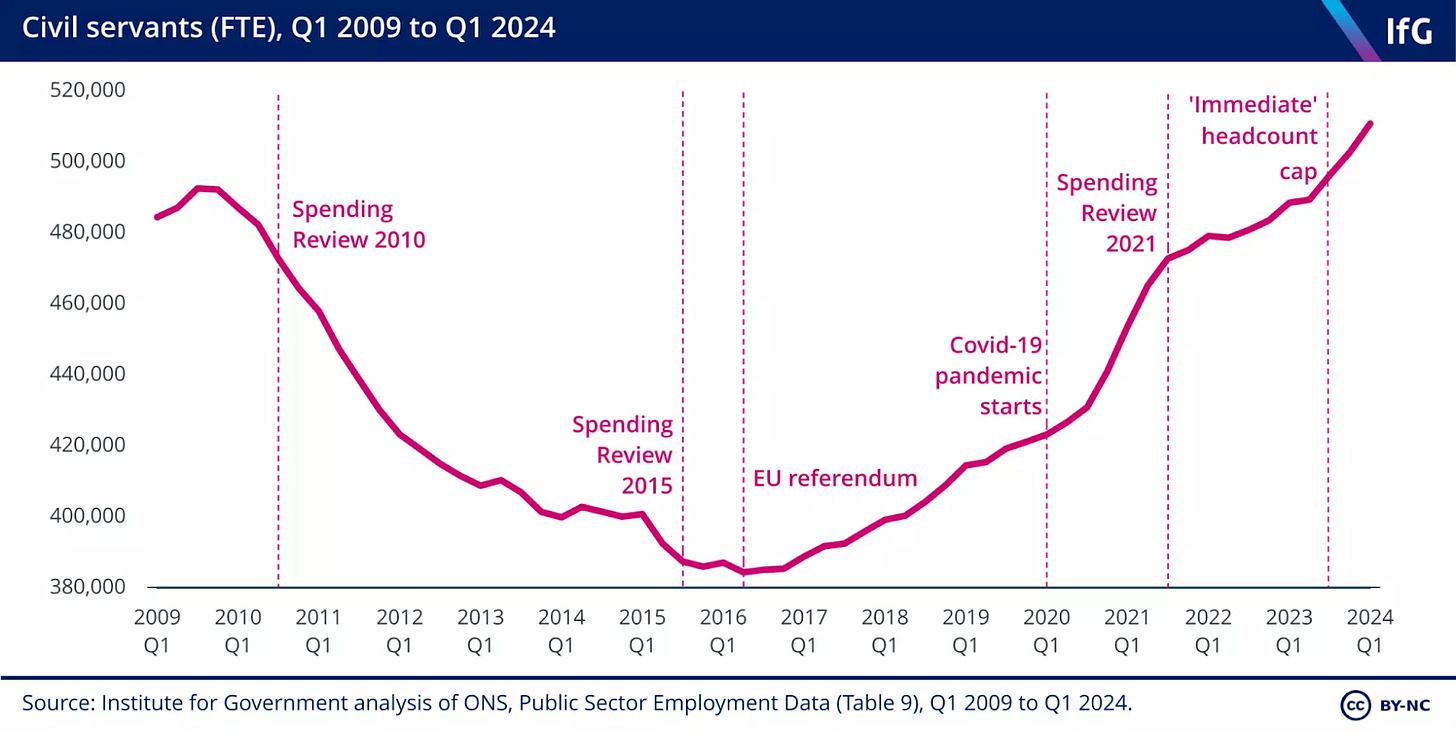Things can only get … better?
Look, I never said they were perfect
I don’t quite recall, during the election, Keir Starmer promising a “shared struggle”. But, at the Labour Conference this week, that’s what he said was ahead of us.
Every member of the frontbench has spent weeks now laying the groundwork for a brutal autumn Budget. In fact, in his first set-piece as PM, Starmer warned: “things will get worse before they get better.”
That’s one way of setting yourself apart from Blair.
Where’s all the money?
Labour’s conundrum is that they need more money. A good NHS, a functioning justice system, quality schools, decent roads, effective social welfare - it all costs money. And that’s money the government doesn’t have.
Part of the reason for the financial black hole is that the civil service has swollen since Brexit. I don’t remember the Brexit bus saying: “We send the EU £350m a week. Let’s fund more bureaucracy instead!”
This is, of course, a fraction of the financial woes that the government is facing. But, just as Brexiteers failed to mention the many ramifications of leaving the EU, Labour weren’t exactly transparent about their tax and spend plans during the election.
“We will not raise taxes on working people”
Labour pledged, repeatedly and emphatically, that they would not raise taxes for working people. But, it was fairly obvious, they would have to.
The tax plans they did fess up to did not go far enough. One of their biggest taxation policies was ‘closing the loopholes’ on non-doms, aiming to raise £5 billion. That’d generate enough to fund the NHS for … a week or two. They’d need more money.
Yet the party insisted: no tax rises on working people. That promise had an asterisk: they defined ‘taxes on working people’ as income tax, national insurance and VAT. Never mind the fact that many working people also pay capital gains tax, for example.
It was pretty obvious that they had to find more money if they wanted to drive the radical change they were promising. Former Tory MP Rory Stewart challenged Rachel Reeves on this, which led to a pretty tetchy exchange. “It’s about how you run things,” she insisted.
https://twitter.com/RestIsPolitics/status/1798323366736388169
The state of the country’s finances backed Labour into a corner: they have to raise tax. So why didn’t they just admit it during the campaign?
Theresa May’s manifesto mishaps
Cast your mind back to January 2017: Theresa May had a 41% approval rating with the public (Keir Starmer’s today, for reference, is -26%).
A lead that strong makes you unbeatable, you might think - Theresa May and her team certainly did.
Feeling untouchable, they included some pretty divisive measures in the Tory manifesto. Including a policy in the manifesto makes it easier for the PM to pass, since there is a longstanding convention that the House of Lords will not vote down manifesto pledges.
Among her controversial proposals was a free vote on fox hunting and a social care policy later branded the ‘dementia tax’.
Those policies would be her undoing, resulting in a lost majority in the 2017 election.
The lesson for Starmer is this: while including policies in your manifesto might spare you from the wrath of the Lords, it exposes you to the wrath of the voters.
Starmer is a smart guy. I suspect that he knew - as we all did - that tax rises were necessary. He opted to omit them from his manifesto and defer the popularity dent until after he’d won. There’s no law that says the manifesto must be the whole truth.
Free gear Keir
Of course, tax rises are fine for Starmer: he doesn’t pay for anything!
I’m generally not that bothered by political donations, it’s part of the game. If Starmer wants to watch Arsenal games, I’d rather the club foot the bill for his box than the taxpayer. And, frankly, if people were lining up to give me free stuff - I wouldn’t spend too much time thinking about the morals of it all.
But, after 14 years of demanding a squeaky clean politics, it’s a bad look. Accepting donations for campaigning is one thing, but Starmer should have drawn a firm line under that once he started governing.
Instead, he drew a scribbly line under it by promising not to accept donations towards his wardrobe. But promising no donations towards clothes is a bit like promising no taxes on working people: what about the rest?! He should’ve taken a stronger line: that means no donors funding holiday homes, birthday parties, or Taylor Swift tickets.
I’m sorry to say, though, that part of the solution to this is paying Parliamentarians more. They are in one of the most arduous and important jobs in the country, under an unmatched level of scrutiny. If you pay them well, you can ban all donations and second jobs.
Ahead of a brutal budget
Something has to give: either we become a country that expects less of our public services, or we raise taxes. Starmer has, it seems, chosen the latter.
I think it’s the right choice: taxes should go up to pay for the things that matter.
It’s why I think it’s the right thing to scrap the winter fuel allowance. When money is tight, the taxpayer shouldn’t be contributing towards Alan Sugar’s heating bill.
But it can’t help but leave a sour taste in the mouth when politicians don’t mention, during an election campaign, taxation plans they seemed to have all along.
And, of course, accepting all of those freebies was a massive misstep.
There’s a lot of road left to run for the Labour government, but now the pressure is on for them to start delivering. Things have got to get better.



did you write this for me!?